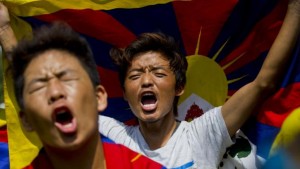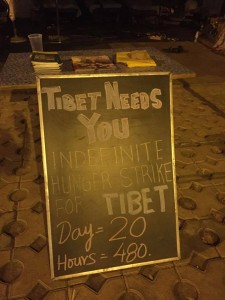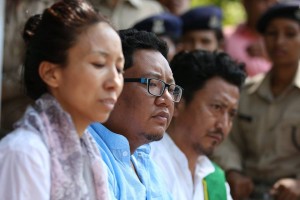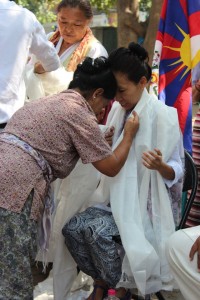What started on September 10 as an indefinite hunger strike by Tibetan Youth Congress (TYC) in New Delhi, India, has finally seen the protestors’ concerns being heard. The participants recently met RK Sharma, Deputy Head of the United Nations Information Centre in Delhi, and submitted a memorandum urging the organisation to respond to their five-point demand.
Earlier this month, merely two days after China celebrating the 50th anniversary of the “founding of the Tibet Autonomous Region” (TAR) in Lhasa, three council members of the TYC began an indefinite hunger strike at Jantar Mantar in New Delhi.
TYC, the largest non-government pro-independence group of the Tibetan exiles, hopes to draw the world’s attention to the situation inside Tibet and to show solidarity with their fellow Tibetans through this strike.
The participants – Vice President Tamdin Hrichoe, Information and International Relations Secretary Tsewang Dolma, and Finance Secretary Tenzin Wangchuk – made five demands to the United Nations.
These were: to raise the issue of Tibet in its General Assembly and Human Rights Council Session; to urge China to address the demands of the self immolators in Tibet; to urge China to provide evidence that the 11th Panchen Lama Gendun Choekyi Nyima is alive; to urge China to immediately release political prisoners imprisoned innocent Tibetans; and lastly, to send a special delegation to assess the current critical situation in Tibet.
“However, instead of addressing the demands of these courageous Tibetans, the Chinese government has tightened its control over Tibet and vehemently criticizes the Tibetan spiritual teacher His Holiness the Dalai Lama,” stated TYC.
Further condemning the recent celebrations that the Chinese government has imposed in Tibet, TYC stated that “this is 50 years of colonisation, and a celebration like this is uncalled for when 143 Tibetans have self-immolated inside Tibet protesting against China’s policies.”
Contrasting a White Paper report released recently by the Chinese government last week that denounced the Dalai Lama’s demand for “high degree of autonomy” as an obstruction to progress and claimed that Tibet is “now in its golden age”, TYC President Tenzing Jigme said that “this is certainly not the Golden Age but is the Darkest Age in the history of Tibet and there is nothing to celebrate.”
He elaborated that the Communist Party has enforced a series of campaigns and policies to systematically stifle Tibetan culture, language, identity, spiritual traditions and destroy Tibet’s fragile environment impacting the world at large and Asia in particular.
He added, “We are wary of interventions that might forcefully stop the hunger strike like it has been in the past but we have prepared and have discussed those contingencies. We are determined to make this campaign a fruitful one.”
On September 22, there was good news to be shared – the Tibet issue was being raised by representatives of US and the EU during the Human Right Council meeting in Geneva. Tamdin Hrichoe, on hearing this news, said, “The news is welcoming and one of our demands. But we will continue until the aims and objectives are met.”
HE Jean-Marc Hoscheit, Permanent Representative of the Grand-Duchy of Luxembourg on behalf of the European Union, and the delegation of the United States of America, Ambassador Keith Harper reportedly gave statements calling China to cease undue restrictions on religion in Tibet and urged to address the root causes of unrest and foster dialogue with Tibet.
The next day, TYC announced, “13 days and 312 hours later, without any food, the three TYC Executive members on hunger strikes’ (2male, 1 female) bodies are weak but their minds are strong and their will to go on with conviction and determination is even greater.
The strike also coincided with Chinese President Xi Jinping’s high-profile state visit to the US on September 25. “Leaders of the world have a responsibility to speak up for those oppressed. We ask that the President not only raise the issue of Tibet with Xi, but send a strong message that human rights and freedoms of Tibetans must be respected”, added Jigme.
Closer to home, as the health of the participants continue to deteriorate, especially Tsewang Dolma’s, they have decided to continue the movement. The anger has spread, with over 200 supporters carrying out a peace march from Khan Market to the UN Office to show their solidarity with the strikers. “We will continue until we receive a positive response from the UN,” said Tenzing.
TYC has previously organised three indefinite hunger strikes in New Delhi, Geneva and New York.








 Print
Print Email
Email